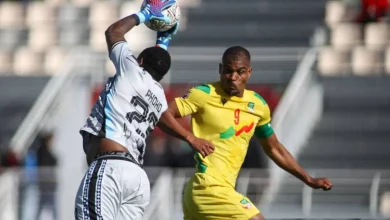Tanzania’s World Cup wake-up call — When hope replaces planning

DAR ES SALAAM: THERE’S an old saying whispered around East African football circles, usually after the Taifa Stars have suffered yet another heartbreak: “Tunahitaji miujiza.” We want miracles.
And so, it was again on that humid September evening at the sparkling New Amaan Complex in Zanzibar.
The floodlights shimmered, the drums thumped, prayers were named, loudly and Tanzania believed. For 90 minutes, hope roared louder than logic.
But in the 58th minute, Niger’s Daniel Sosah decided to remind us that football, unlike faith, demands more than hallelujahs.
One perfectly timed run, one calm finish and our World Cup dream vanished — poof! — like steam from a pot of pilau at a church fundraiser.
The 1–0 defeat was more than a scoreline; it was an epitaph.
Tanzania’s 2026 FIFA World Cup campaign was officially dead, buried and mourned before the 60thminute mark.
You could feel the pain in the stands.
The Zanzibari crowd, usually boisterous and poetic in their chanting, fell into uneasy silence.
Some waved flags, others muttered prayers under their breath, as though God might still find a late equaliser in the Book of Life.
But the truth — as brutal as a last-minute penalty miss — is this: Tanzania didn’t lose in Zanzibar. They lost months ago, in the early qualifiers, when points were dropped against teams whose names we now struggle to pronounce.
It wasn’t Niger that killed the dream. It was preparation — or the lack thereof — that strangled it slowly.
Every campaign seems to start with grand speeches, motivational hashtags and a hopeful send-off at the airport.
Then, somewhere between kick-off and elimination, the plan collapses into chaos.
We talk of “God’s timing” instead of tactical pressing, “Kapu la mama” instead of grassroots academies and “miracles” instead of match fitness.
Meanwhile, our neighbours — Uganda, Kenya, even tiny Madagascar — quietly invest in youth systems, scouting networks and coaching qualifications. We invest in prayers.
After the loss to Niger, the calculators came out.
With just one match left, Tanzania could manage a maximum of 13 points — mathematically short of the top four runners-up in CAF’s unforgiving qualification format.
Gabon sat comfortably on 18 points. Madagascar, a team once written off as footballing tourists, had 16. Cameroon and Senegal were on 15.
Even Uganda — yes, those same Cranes had 15 points. Tanzania? Ten.
The gulf is more than numerical; it’s philosophical.
Gabon doubled our points, Madagascar are six ahead and even Namibia (jamani hata Namibia!) have quietly overtaken us.
It’s not just about talent; it’s about structure, planning and seriousness.
If football were a class exam, Tanzania would be that student who studied the night before, prayed in the morning and then blamed the teacher for setting a difficult paper.
While we were licking wounds in Zanzibar, the rest of Africa was celebrating.
Ivory Coast, Senegal and South Africa all sealed their tickets to the 2026 World Cup in style. The contrast couldn’t be starker.
Senegal dismantled Mauritania 4–0, with Sadio Mané conducting the orchestra like a man playing his third World Cup symphony.
Ivory Coast brushed aside Kenya 3–0, looking every bit the AFCON champions, they are.
South Africa? They turned Mbombela into a carnival, beating Rwanda 3–0 and dancing all night.
And then there was Nigeria — oh, Nigeria.
Victor Osimhen scored a hat-trick as if to remind the continent what professionalism looks like when mixed with purpose.
Their 4–0 demolition of Benin wasn’t just football; it was theatre.
These nations aren’t relying on divine intervention. They’ve invested, heavily, in coaching education, youth academies, data analytics, nutrition and sports psychology. They’re building systems, not slogans.
Let’s be honest — Tanzanians love hope. We package it, tweet it and sing it into our national psyche.
Every tournament starts with “Hii ndiyo safari yetu,” and ends with “Ah, Bahati si yetu…Tutaenda next time.”
But next time never seems to come. Because football, like any other discipline, rewards structure, not sentiment.
To reach the World Cup, a nation must start at the foundation — nurturing players from the age of six or seven, not picking half-fit talents from street tournaments three months before qualifiers.
It needs qualified coaches, modern facilities and consistent competition. Not endless motivational speeches or lastminute camping in Dubai for “morale boosting.”
When a nation prays more than it trains, it should not be shocked when others outrun it. Because the same God is not exclusively for Tanzania.
Two Down, One to Go: First, it was CHAN — gone. Now, the World Cup — gone too.
Tanzania’s final hope for redemption this season lies in the upcoming AFCON qualifiers and, for those seeking club glory, the CAF Champions League and Confederation Cup campaigns.
Yanga and Simba will once again carry the national flag into Africa’s footballing coliseum, each hoping to prove that Tanzanian clubs can still roar where the national team stumbles.
Singida and Azam will chase the smaller continental trophies, trying to remind us that the game still breathes beyond the despair.
But even there, warning signs blink like red lights at a railway crossing.
Clubs spend fortunes on foreign players but pennies on academies. Coaches change faster than streetlights.
We celebrate buying a foreign striker but ignore the local defender who trains without proper boots.
If we don’t learn now, we never will.
Look at Morocco. Their 2022 World Cup fairytale was no accident.
Years of investment in the Mohammed VI Football Complex, structured youth leagues and certified coaching paid off.
Senegal followed a similar path, ensuring that even their Under-17 side mirrors the senior team’s style and discipline.
Meanwhile, in Tanzania, our grassroots tournaments are treated as weekend entertainment. Scouts are rarely present.
Talented kids disappear because there’s no follow-up system. Coaching badges? Still seen as luxury items.
We are a nation that loves the spectacle of football, but not its science.
After every win — rare as they are — you’ll hear the same chorus: Bonuses, allowances, public handshakes and photo ops.
Players receive rewards for “making the nation proud.” But pride doesn’t pay when the team is out by September.
We’ve turned incentives into the main strategy, as if patriotism can be purchased. Yet, as many African powerhouses have shown, money without management breeds complacency.
What Tanzania needs isn’t more allowances. It is accountability. Let the rewards follow achievement, not accompany mediocrity.
Of course, there’s nothing wrong with praying. It is good for the soul. But football requires more than blessings; it demands a blueprint.
Even God, one suspects, must be growing weary of hearing the same pre-match pleas from both sides: “Lord, let us win.”
And He must look down and say, “My children, I have already given you legs … now go train!”
The Almighty, after all, is not a referee. He doesn’t award penalties for piety.
As the New Amaan Complex emptied that night, the drums quieted and fans shuffled home. Some blamed luck. Others blamed the referee. Few blamed the system.
But until we face that truth — that footballing success is built, not wished — Tanzania will continue to orbit around the same cycle: Hope, hype and heartbreak.
We are capable, no doubt. We’ve seen flashes of brilliance — against Uganda, in CECAFA, in club football. The talent exists. But talent without structure is like a ship without a compass — destined to drift until the storm swallows it whole.
The 2026 World Cup will go on — in the United States, Canada and Mexico — and we’ll watch from our sofas, commentating passionately on WhatsApp groups and Facebook pages.
ALSO READ: Stars’ World Cup dream shuttled
We’ll say things like, “Kama tungepata nafasi, tungewapiga hao!” (If we had qualified, we’d beat those teams!).
But deep down, we’ll know we weren’t ready. The question is whether we’ll finally decide to prepare, properly, for the next one.
Or whether, come 2030, we’ll once again be standing in the same place, holding the same “Kapu la mama”, whispering the same prayer to the same God who’s still waiting for us to train.
Because football, dear Tanzania, rewards the disciplined — not the desperate.





